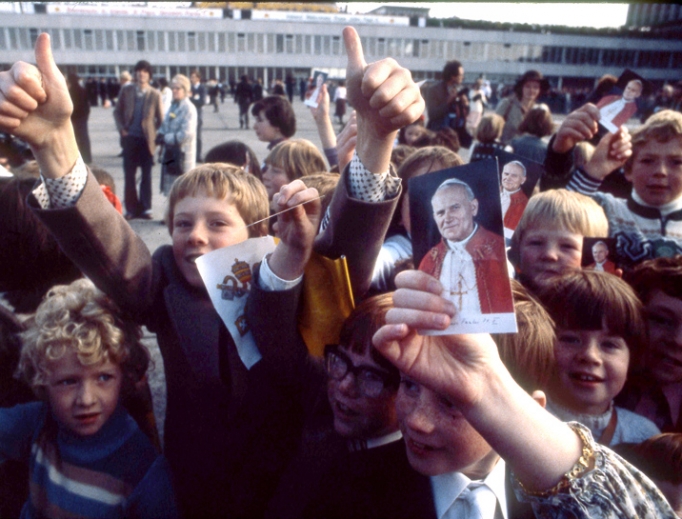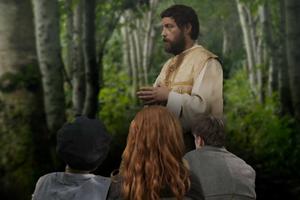Filmmaker Highlights How John Paul II’s 1979 Visit Aided Irish Peace Process
John Paul II in Ireland: A Plea for Peace gives historic lens to Protestant-Catholic conflict.

Documentary filmmaker David Naglieri’s work includes The Face of Mercy (2016), Guadalupe: The Miracle and the Message (2016), both narrated by Jim Caviezel; Liberating a Continent: John Paul II and the Fall of Communism (2016); and John Paul II in America: Uniting a Continent (2014). His latest documentary is John Paul II in Ireland: A Plea for Peace. The Register spoke with Naglieri about the timeliness of the Irish-focused film in the wake of the World Meeting of Families, held last month in Dublin.
Why did you decide to make a film about Pope John Paul’s 1979 visit to Ireland?
Carl Anderson, the supreme knight of the Knights of Columbus, learned of how John Paul II had helped ignite the peace process in Northern Ireland during his 1979 papal pilgrimage, and he asked me to explore this largely untold story through a documentary film. After more than 40 interviews and numerous trips to the Emerald Isle, we are proud to unveil John Paul II in Ireland: A Plea for Peace, a film we feel makes a compelling case that Pope John Paul did indeed sow the seeds of peace during that epic pilgrimage.

The premise of the film is something new: In what ways did you discover that Pope John Paul was key to the Irish peace process?
The Pope’s visit and his words in Drogheda resonated in different ways with different audiences. Protestant leaders in Northern Ireland, such as Rev. Harold Good and Sir Jeffrey Donaldson, describe in our film how the Pope’s message helped sway the opinion of Protestants in Northern Ireland, who oftentimes viewed the Catholic Church and the IRA as one and the same. The Pope’s words influenced Father Alec Reid, a Redemptorist priest who went on to play a supremely important role in kicking off the peace process, in a different way. Reid was one of the first to realize that while attention focused on the Pope’s appeal for peace, equally significant were his words to political leaders to remove the injustices that gave rise to violence and his call to search for “a different way.” That second and lesser-celebrated appeal very much gives rise to the secret talks that Reid set up between rival leaders John Hume and Gerry Adams. Those talks subsequently become the basis of the peace process culminating in 1998 with the Good Friday Agreement. These are two ways the Pope helped sow the seeds of peace. There are others explored in the film, which all indicate John Paul helped create the environment that made a peace process possible.
What has been the reaction to the movie?
I have been really pleased with the reaction thus far. We had a director’s screening in Connecticut for an audience of nearly 200. I was impressed with the amount of questions and comments the film generated. There are 60 million Americans with Irish descent. This film tells the history of Ireland, explains the Northern Ireland conflict, and then unveils the remarkable workings of the Spirit in the peace process. It’s a film that I hope can continue to be a conversation starter for those interested in exploring the impact of faith on public affairs.
How would you describe your work?
I am blessed to have had the opportunity to write and produce documentary films that explore the richness of our history and identity as Catholics.
In regard to each film, how long does it take from conception to completion?
Typically, I will spend three-four months conducting research while the filming takes place over several months to follow. Post-production times can vary based on the number of revisions needed. Typically, it takes 12-18 months to go from conceptualization to final product.
When and where do you work? Is there a set routine?
I have an office where I spend most of my working hours. However, I also love working in coffee shops, and my favorite place to do creative writing is at the Marist College library (my alma mater) in Poughkeepsie, New York, which boasts beautiful views overlooking the Hudson River.
Have you ever suffered the equivalent of “writer’s block”?
We all get in a rut at some point. I think the best way to handle it is to walk away from your project for a period of time and do something totally different, like working out or listening to music. I find I come back refreshed and ready to begin anew.
How much, if any, does other media — books, music, art — feed your creative process?
Very much so. I enjoy watching other documentary films for inspiration on new storytelling techniques and visual style. When writing, I also like to listen to music that evokes the mood or tone I am looking to set at a given time.
Who are your favorite filmmakers?
I love the work of Alfred Hitchcock, Frank Capra, Martin Scorsese and Mel Gibson. For documentaries, I think Errol Morris is the master of the craft.
And what are some of your favorite films?
Errol Morris’s Academy Award-winning documentary The Fog of War is a brilliant film. I very much enjoy ESPN’s 30 for 30 series and Ken Burn’s documentaries The Civil War and Baseball. For feature films, I love underdog stories (who doesn’t?) and films with themes that explore individual conscience pitted against corrupt institutions and spiritual awakenings. In that vein, a few of my favorites include: On the Waterfront, A Man for All Seasons, Rudy, Rocky, The Mission, The Exorcist and Ben-Hur.
How do you understand your work in terms of vocation?
I believe that people cut off from their roots drift. Today, there is a great need to educate Catholics and non-Catholics alike about the richness of our heritage and the great contribution faith and spirituality has made to Western Civilization. In producing films that aim to help viewers more deeply appreciate the Church’s story, and inspire them to live their faith more authentically and courageously, I hope to live my vocation in service to Christ.
If being a filmmaker has taught you anything — what is it?
That today, more than ever, the world needs the light of the Gospel. It needs men and women emboldened to live their faith with steadfast courage. We need films to be a source of light to help scatter the darkness. We also need films that combine top production quality with a coherent and authentic message that is capable of cutting through the noise of a digital world to form the next generation in truth.
Register correspondent K.V. Turley writes from London.
- Keywords:
- catholic history
- church in ireland
- documentaries
- k.v. turley
- papal travels
- pope st. john paul ii

















